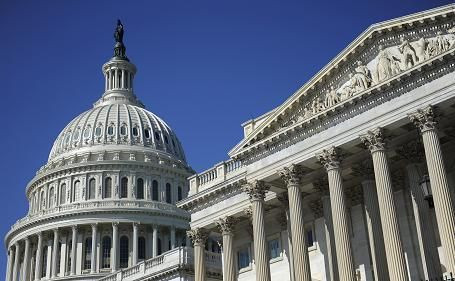US House: No Bill Votes Tonight - Nation To Go Over Fiscal Cliff, For At Least 1 Day

UPDATE 4:25 EST: The U.S. House has just announced that there will not be a tax bill or budget deal vote tonight, ensuring that the nation will go over the fiscal cliff for at least one day.
Doug Heye, a spokesman for House Majority Leader Eric Cantor, R-Vir., told The Washington Post Monday afternoon: “It is impossible for the House to schedule a vote on a deal that does not exist.”
The word came after President Barack Obama announcd on Monday that it appeared a fiscal cliff deal is in sight, despite unresolved issues. Obama delivered news about the negotiations' progress in front of a group of diverse middle-class Americans at the White House.
"Democrats and Republicans have to get this done," Obama said. "They are close but they are not there yet."
The potential deal now in the works will include no tax hike on middle-class families. It will also include an extension of tax credits for families with children; tuition credit; and unemployment insurance for millions of Americans; and it will provide tax breaks to clean-energy companies.
At the moment, the sticking point is the sequester, or the automatic spending cuts set to go into effect on Jan. 1, as neither side can agree on a time frame for delaying it. Hundreds of billions of dollars in federal spending will be cut in the New Year if congressional leaders broker no other alternative. This will include cuts to the Pentagon and several federal agencies.
Democrats were hoping for at least a two-year delay in these cuts. However, Republicans countered, saying spending cuts should cover the delay. The GOP instead suggested a three-month delay on the sequester.
Pressure mounted on Congress over the weekend to produce an alternative to the fiscal cliff, the combination of automatic of tax increases and spending cuts that will occur if no budget deal is reached by Dec. 31.
In Monday's press conference, Obama said he would have liked a larger agreement that would have dealt with spending in a balanced way.
“But with this Congress, that was obviously a little too much to hope for at this time,” Obama said. He added that perhaps it will take several steps.
All eyes remain on Senate Minority Leader Mitch McConnell, R-Ky., and Vice President Joe Biden, as the negotiations are ongoing. McConnell tapped Biden on Sunday when negotiations with Senate Democratic Leader Harry Reid hit a deadlock.
Without a bipartisan deal, Reid has been advised by Obama to put a bill to the floor for an up-or-down vote. This bill will ask for a tax-cut extension for the middle class and unemployment insurance for some two million Americans. Whether the House will accept this measure is uncertain, so failure on the part of lawmakers to agree will push the nation over the cliff.
A bipartisan deal would trigger the confidence needed for more investment in America, leading to additional growth.
Agreeing that revenue should be a starting point, Democrats and Republicans were close to a compromise on a tax increase threshold with Democrats reportedly proposing a hike on people earning more than $360,000 annually and households with more than $450,000 income. The GOP’s counter-offer was to increase taxes on those individuals making more than $450,000 and households bringing in $550,000 annually.
Sen. Lindsey Graham, R-S.C., was optimistic about the progress, telling “Fox News Sunday” early on Sunday that whatever is accomplished will be a political victory for President Barack Obama.
“Hats off to the president,” Graham said. “He stood his ground. He’s going to get tax rate increases, maybe not $250,000, but [on] upper income Americans.”
Obama insisted on a tax hike for households with incomes of more than $250,000 a year while on the campaign trail, and he opened fiscal cliff negotiations with House Speaker John Boehner on the same note. This was before Boehner left the negotiating table to try to push through his alternative fiscal cliff “Plan B” but failed to get enough votes for it, as it would have allowed for a tax increase on those with annual incomes of $1 million or more, a threshold too low for rank and file Republican House members too approve.
Sunday's talks stalled when Republicans demanded that the Democrats' proposal include a chained consumer price index, or chained CPI. This is a new way of calculating inflation that would ultimately result in smaller payments to Social Security beneficiaries.
Republicans later withdrew their demand. The optimism Graham had earlier in the day was gone by Sunday evening.
“I’m incredibly disappointed we cannot seem to find common ground,” he tweeted. “I think we’re going over the cliff.”
In a rare interview on Sunday on NBC’s “Meet the Press,” Obama said if all efforts fail, a tax cut will be proposed first thing in 2013.
© Copyright IBTimes 2024. All rights reserved.






















